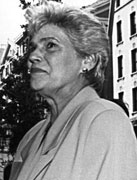Violeta Chamorro

President of Nicaragua
Violeta Barrios de Chamorro, nee Violeta Barrios (born October 18, 1929, Rivas, Nicaragua), newspaper publisher and politician who served as president of Nicaragua from 1990 to 1997.
Chamorro, who was born into a wealthy Nicaraguan family (her father was a cattle rancher), received much of her early education in the U.S. states of Texas and Virginia. In 1950, shortly after the death of her father, she returned to Nicaragua, where she married Pedro Joaquim Chamorro Cardenal, editor of the newspaper La Prensa, which was often critical of the Somoza family dictatorship. The Chamorros were forced into exile in 1957 and lived in Costa Rica for several years before returning to Nicaragua after the Somoza government declared an amnesty.
On January 10, 1978, Pedro Chamorro, who had continued to criticize the Somozas and had been imprisoned several times during the 1960s and '70s, was assassinated. His death helped to spark a revolution, led by the Sandinista National Liberation Front, which toppled the government of Anastasio Somoza Debayle in July 1979. A member of the Sandinista ruling junta in 1979-80, Violeta Chamorro soon became disillusioned with the Sandinistas' Marxist policies, and later she became an outspoken foe. She took over La Prensa, which was frequently shut down during the 1980s and was banned completely for a period in 1986-87. During the 1980s she was accused by the Sandinistas of accepting money from the U.S. Central Intelligence Agency, which was then providing support to opposition groups and directing the Contra rebels in their guerrilla war against the Sandinista government.
An end to the guerrilla war was negotiated in the late 1980s, and free elections were scheduled for 1990. Chamorro, drafted as the presidential candidate of the 14-party National Opposition Union (Union Nacional Opositor; UNO) alliance, won a surprisingly easy victory over President Daniel Ortega Saavedra, head of the Sandinistas. She was inaugurated on April 25, 1990, becoming Central America's first woman president.
During her presidency Chamorro reversed a number of Sandinista policies. Several state-owned industries were privatized, censorship was lifted, and the size of the army was reduced. At the same time, she retained a number of Sandinistas in the government and attempted to reconcile the country's various political factions. Many credit her conciliatory policies with helping to maintain the fragile peace that had been negotiated. Barred from running for a second term, she retired from politics after her term ended in January 1997.